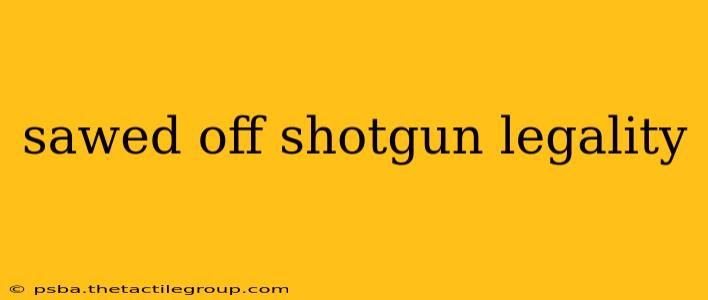The legality of sawed-off shotguns is a complex issue, varying significantly depending on location and specific firearm characteristics. This guide aims to clarify the legal landscape surrounding these weapons, emphasizing the importance of understanding local, state, and federal regulations before possessing or handling one. This information is for educational purposes only and should not be considered legal advice. Always consult with legal counsel or relevant authorities for definitive answers.
What Constitutes a "Sawed-Off" Shotgun?
The definition of a "sawed-off" shotgun hinges on its overall length and barrel length. Federal law in the United States, specifically the National Firearms Act (NFA) of 1934, defines a short-barreled shotgun (SBS) as a shotgun with a barrel length of less than 18 inches or an overall length of less than 26 inches. These lengths are critical determinants of legality. Any firearm meeting these criteria falls under the NFA's strict regulations, regardless of its original design or modifications.
State Laws and Variations
While federal law provides a baseline, individual states may have their own laws regarding sawed-off shotguns, some of which may be stricter than federal regulations. Some states may entirely prohibit their possession, while others might have specific licensing requirements or restrictions on their use. It's crucial to research the specific laws of your state before considering possessing a firearm that might be classified as a sawed-off shotgun. Failure to comply with state laws can result in serious penalties, including hefty fines and imprisonment.
The National Firearms Act (NFA) and its Implications
The NFA of 1934 regulates various types of firearms considered "dangerous and unusual," including sawed-off shotguns. Possessing an SBS under the NFA requires navigating a complex registration process, including:
- Tax Stamp: A significant tax is levied on the registration of any NFA firearm, including SBSs.
- Background Check: A thorough background check is conducted by the Bureau of Alcohol, Tobacco, Firearms and Explosives (ATF).
- Registration: The firearm must be registered with the ATF, maintaining a permanent record of ownership.
Failure to comply with the NFA's provisions regarding sawed-off shotguns leads to severe legal repercussions, potentially including substantial fines and imprisonment.
Exceptions and Considerations
There are some exceptions and considerations regarding the legality of short-barreled shotguns. For instance, certain antique firearms may be exempt from NFA regulations. However, determining whether a specific firearm qualifies as an antique requires careful examination and expertise, often necessitating consultation with firearms specialists and legal professionals. Additionally, law enforcement and military personnel might have legitimate reasons for possessing SBSs within the scope of their duties, but this requires adherence to strict regulations and procedures.
Penalties for Illegal Possession
The penalties for illegal possession of a sawed-off shotgun are substantial and can vary based on the jurisdiction and circumstances. These penalties can include:
- Imprisonment: Significant jail time is a possible consequence.
- Fines: Heavy monetary penalties can be imposed.
- Forfeiture: The firearm may be confiscated by authorities.
- Criminal Record: A criminal record will significantly impact future opportunities.
Conclusion: Prioritize Safety and Legal Compliance
The legality of sawed-off shotguns is multifaceted and governed by a complex web of federal and state laws. Always prioritize safety and adhere to all relevant regulations. Before acquiring or modifying any firearm, seek legal counsel and thoroughly research applicable laws in your area. This guide serves as a general overview and is not a substitute for professional legal advice. Remember, ignorance of the law is no excuse for non-compliance.

